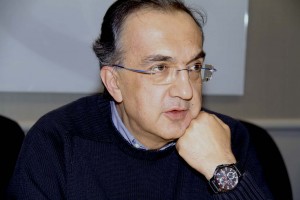
The only exec staying in his current spot will be Sergio Marchionne, who'll remain CEO of both Fiat and Chrysler.
Delivering on a promise to streamline his trans-Atlantic alliance, CEO Sergio Marchionne announced a broad realignment of the management structure that will increasingly result in Chrysler and its ally Fiat operating as one global company.
Significantly, the move will plant the nexus of power for the two automakers in the Detroit suburb of Auburn Hills, Michigan, though Fiat’s headquarters will remain based in Turin, Italy. That vote of confidence comes as a sharp rebuke to what happened during the unsuccessful and eventually abandoned merger of Chrysler and Daimler AG, where power clearly shifted to Germany.
One concern for industry analysts is whether Marchionne has moved far enough, particular when it comes to the dozens of senior executives who will continue to report directly to the Canadian-educated CEO.
“These appointments are the result of an extensive process of evaluation of the technical and leadership skills of the individuals who have been appointed to the GEC,” or Global Executive Committee, said Marchionne. “But equally important is the fact that they reflect the multicultural geographically diverse nature of our businesses.”
While the bulk of the GEC team is familiar to those who have watched Chrysler and Fiat over the last several years, virtually everyone but Marchionne himself moves to a new position. Olivier Francois, the new head of the Fiat brand, for example, had until this week been running both the American Chrysler division and the Italian Lancia marque simultaneously.
Earlier this week, Marchionne stressed that he needed to ensure Chrysler’s deep American roots were respected in the shake-up, and that was largely borne out by the nationality of the new managers handling brands like Jeep, whose new Chief Operating Officer is Michael Manley.
Italians, nonetheless, will hold eight of the new GEC posts, with two Germans, two Britons, a Brazilian, a Frenchman, a Canadian and a Swiss. But among the five Americans, current Chrysler Chief Financial Officer Richard Palmer will now serve as the trans-Atlantic enterprise’s CFO.
The management shake-up complements other efforts initiated by the 59-year-olod Marchionne, who says he is pushing to generate increased shareholder value – while also ensuring the Fiat/Chrysler enterprise has the size and economies of scale to remain competitive in an industry increasingly dominated by giants like Toyota, Volkswagen and General Motors.
Among the critical moves, future products will share common platforms, so a compact sedan replacing the current Chrysler 200 in the U.S. will be sold under Fiat and Lancia badges in other parts of the world.
The restructuring follows Fiat’s purchase of the remaining U.S. and Canadian holdings in Chrysler, giving the Italian maker a 53.5% stake in its ally. That is eventually expected to reach 70% or more. The finances of both companies have been consolidated. But a formal merger is not likely to occur for perhaps a year or more.
Also uncertain is the timing of the long-anticipated Chrysler IPO. Some analysts, including Deutsche Bank’s Rod Lache, have speculated that may longer take place, though Marchionne continues to insist it’s necessary to enhance the alliance’s balance sheet and should occur in 2012.
“We have now reached the right moment to step on the accelerator of the Fiat-Chrysler integration,” Marchionne said in announcing the management changes.
